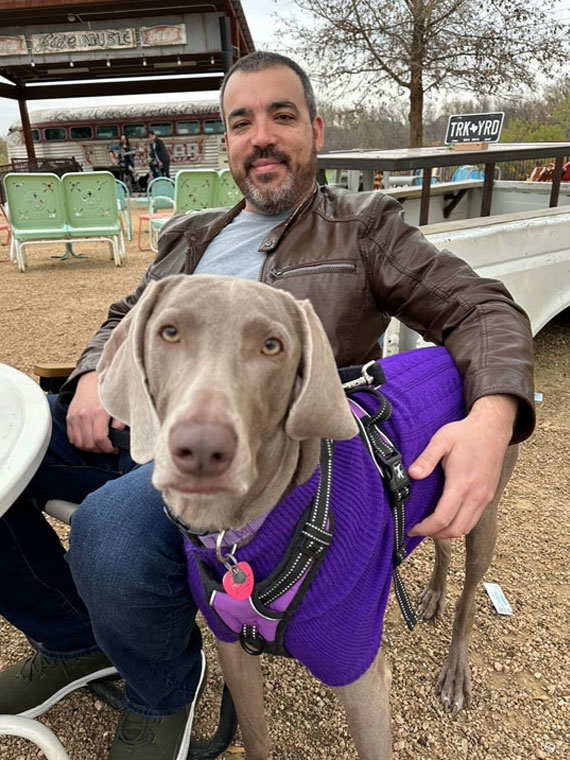Two Department of Information Science students have been selected as "Great Grads" by the University of North Texas (UNT). The Great Grads recognition celebrates soon-to-be graduates that have outstanding achievements, excelled in coursework, or overcome adversity to earn their degree. This fall, Blessing Eben and Jake Harris, soon-to-be graduates of the B.S. in Information Science and B.S. in Data Science programs, respectively, have been nominated and selected by UNT as Great Grads. Read their inspirational stories below which have been republished from the Great Grads: Fall 2022.

When resilience meets a Blessing.
Staying ahead of the curve has always been one of Blessing’s greatest traits — she was in the top 7% of her senior class at Mesquite High School, scored 1320 on her SAT, and received 25 scholarship awards from schools she applied to.
“I worked really hard in high school,” Blessing says. “Maintaining good grades was a priority.”
After graduating from high school, Blessing was determined to discover her identity and develop who she would become. She was ready to set sail for Howard University to pursue a degree in Psychology to understand the behavioral side of people’s decisions. Blessing was unable to attend Howard University — she didn’t receive enough financial aid for the annual tuition. After realizing the other schools she’d been accepted to weren’t a great fit, she submitted her application to UNT just before the application deadline.
At UNT, Blessing began her academic career as a Computer Science major. She quickly realized coding was not her niche, so she switched to Information Technology with a concentration in Data Science. When she ran into the same problem while coding, she made a final switch to Information Science with a concentration in Data Science.
“Information Science was the program I actually wanted to join at UNT since the technology industry was on the rise,” says Blessings.
Blessing has always had a passion for children and ensuring success for all learning types in the classroom.
“My dream is to help children with their mental health and those who are neurodivergent,” she says. “I want them to understand being different doesn’t mean something is wrong.”
Blessing plans to combine her knowledge of Data Science and her love for Psychology to develop a program structure for classrooms that ensures all students are taught in the best way according to their learning style.
“Most people don’t realize that Data Science has a lot to do with Behavioral Science,” Blessing says. “You have to understand the way people think and how numbers are reflective of people and their habits.”
Between balancing 18-hour course loads, meeting her academic goals and maintaining an active social life, Blessing’s health began to take the back seat. As post-pandemic life began to return some normalcy, she, like many others, was mentally exhausted. In February 2022, Blessing was rushed to the emergency room and was diagnosed with esophagitis.
“I’ve always felt a random aching on the side of my abdomen,” she says. “I don’t have a car so I ignored the pain for a long time.”
Facing uncertainty with her health and believing she wasn’t going to recover, Blessing says that it was her faith, support and accommodations from her professors and the College of Information’s assistant director of Marketing and Outreach, Lisa Hollinger, all of which helped her get through a challenging, dark time in her life.
“If it wasn’t for God, I don’t think I would have had the courage to come back to school with joy and move on with my life,” Blessing says. “My professors were so understanding and supportive. They understood that I was more than a student — I was a person.”
As Blessing prepares for commencement, she encourages students to make their mental and physical health a priority.
“Your environment and what you say to yourself are so important,” she says. “You will thank yourself in the future if you remain consistent with who you are and who you are becoming.”
Never quit.

Those are words Jake Harris lives by. After putting his education on hold to serve three years in the Army – including a 12-month deployment in Iraq – followed by a years-long battle with PTSD, Jake returned to UNT in 2020 and will graduate this fall with a bachelor’s in Data Science. It’s been a 16-year journey that’s taught him the value of perseverance and overcoming adversity, because even in his darkest moments, Jake never quit.
A Denton native, Jake considered enlisting straight out of high school, but ultimately enrolled at UNT in 2006 as a Business Studies major. Over the next two years he changed his major to Political Science, but something wasn’t clicking.
“I didn’t have any direction,” Jake says. “I started working overnights, then my grades started slipping. Then I started neglecting work and classes. A good friend of mine from high school was joining the military at the time, so I decided it was the right change for me.”
Jake left for basic training in July of 2008, and one year later he was deployed to Iraq as a Field Artillery Tactical Data Systems Specialist and lead driver of his Lieutenant Colonel’s security convoy. His unit spent a month in Kuwait before serving the remaining 11 months at various bases throughout the Diyala Province of eastern Iraq.
While serving in Iraq, Jake's unit took a lot of indirect fire, including rocket and mortar attacks. One of his “battle buddies” in his artillery battalion was in a convoy that was hit by an EFP (explosively formed penetrator).
“Both he and an Iraqi interpreter working with the U.S. Army were killed in the attack,” Jake says. “That was especially difficult for everybody in our unit because we were essentially there to wind down operations, so the sudden loss of life when we were so close to going home was felt throughout their entire brigade.”
Jake returned to the states in July of 2010 with his term of service set to end in November of 2011. The brigade began preparing for another deployment at the beginning of 2011. Unsure when that might occur, Jake kept training with the new soldiers who had arrived at their unit. Jake reached the end of his enlistment obligation before the deployment and left the Army. Jake spent the next several years struggling to re-integrate into civilian life because he thought he had to work through his issues by himself and make his own way in the world, even refusing to file a disability claim or take advantage of the G.I. Bill benefits he had earned.
“I didn’t want anyone’s help. I didn’t want anything from anyone,” he says. “I spent years after getting out of the service refusing discounts and free meals. I’d laugh at other vets – my friend included – for getting ‘freebies’ and ‘handouts.’”
As he strained to find his way, Jake’s penchant for service led him to federal civilian government jobs with the TSA and Citizenship and Immigration Services. Even after finding a job that gave him a renewed sense of purpose and rebuilding his social life, something still didn’t quite feel right.
“I’m a strong extrovert by nature,” Jake says. “So I’d go out with coworkers, drink, socialize and have a good time, but it all felt hollow somehow. Like I was just existing, not living. I was still angry. It was almost like I knew I should be doing something different, so I’d get angry all the time at my own laziness and general apathy.”
But Jake was finally shaken out of that apathy when the entire world changed in the spring of 2020.
“The pandemic was actually the final catalyst in getting me to return to UNT,” he says. “When the lockdowns began, I took it as a sign and began initiating my resignation paperwork, while simultaneously beginning my re-enrollment at UNT. We were fully remote for the rest of 2020, so that allowed me to start during the summer and take classes online.”
Jake took another big step that summer with encouragement from his girlfriend and family, filing a VA claim nearly nine years after he had first become eligible.
“I still almost didn’t put PTSD as one of the things I wanted to be evaluated for,” Jake recalls. “I guess I was in denial, but my girlfriend – having been around for my less-than-stellar moments – was the voice of reason.”
The VA evaluation verified Jake was eligible for benefits regarding a few leg issues, ears and hearing loss and PTSD. Although he initially had trouble accepting the diagnosis, he now knows it’s just the beginning of his road to recovery.
“I never felt like I ‘went through enough' to be considered disabled,” he says. “I watched battle buddies break bones, break backs, get TBIs (traumatic brain injury), I know guys who have seen some absolutely horrendous things. Their problems felt like real disabilities.
“I felt like asking for help was taking resources away from them or cheapening what they had gone through. Even knowing it now, it isn’t easy. Knowing hasn’t made it any harder, but actually finding ways to try to heal is difficult.”
Since then, Jake has worked to finish his degree in Data Science, including an internship with Ericsson working in Project Management, U.S. Government account acquisition and data organization. That internship will be extended through the spring of 2023 as Jake works toward his Master’s in Data Engineering at UNT.
True to his heart for service, Jake and his girlfriend have also spent that time fostering more than 20 shelter dogs and helping them find forever homes, half of which would have otherwise been euthanized. He says he’d like to make an even bigger impact after graduation, with thoughts of designing a system that would allow animal shelters to work together more efficiently to transfer animals from overcrowded shelters to ones with more room to spare in order to prevent further unnecessary euthanasia. A system he thinks could similarly be used by government and law enforcement agencies to help locate missing and exploited children. It's that same service mentality that convinced Jake to participate in this very Great Grads series, despite his initial hesitancy, in hopes of helping people who might be going through situations similar to his.
“It’s not easy stuff to talk about,” Jake says. “But if it helps one person get through one day, it’s worth it.
“The hardest times with PTSD are when you’re left with your own thoughts and you have to prevent yourself from spiraling. The best coping mechanism is to never go silent. Don’t face your demons alone. Surround yourself with people you know, trust and can be yourself with. Every day is a battle, but you just have to keep fighting.”
In other words: Never quit.
To read about all the fall 2022 UNT Great Grads, visit the UNT Great Grads webpage.
Published December 12, 2022.




